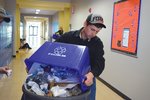

Washington Green Schools is a program providing environmental education and technical support to schools in the state and currently Clark County has a higher number of participating schools than any other county.
“Each year more schools join in and enroll as we work to give them support they need to be successful,” said Michelle Picinich, Clark County’s Green Schools outreach specialist. “We do have the most certified Green Schools in the state and that's due to years of county support of the program. Not all counties support this program at the level we do.”
Over half of the public schools in the county are Green Schools and within the membership schools have certification levels — bronze, silver, gold and platinum. Only five schools in the state are platinum certified and one of them is La Center High School.
“La Center High School is definitely a shining star in our program,” Picinich said. “They are the first and only high school to achieve Washington Green Schools’ Platinum status, which means they have certified in all six areas.”
The six categories are waste, water, school grounds, energy, transportation and healthy buildings. Becoming certified in a category involves a school understanding its current systems in those areas through data, then identifying opportunities to better eliminate waste and implementing projects to accomplish it.
At LCHS it took seven years. The achievement was a school-wide effort, but Rebecca Morris and her environmental studies classes have been leaders of the process. Morris said she got LCHS into the Green Schools program in 2010 and completed their first category, waste reduction, in 2012. LCHS’s final completed category was transportation (renewable fuels) and earlier this school year they were awarded with the platinum trophy.
“I’m very proud of the kids who have contributed, proud enough that I spend 50 to 60 hours a week doing this,” Morris said. “But I don’t have to do much cheerleading, our students want to do this and I’ve even had some that graduate, come back and want to show their grandparents or someone, ‘look, this is what I did for the school when I was a student.’”
With no more categories to complete, Morris said students now focus on maintaining a high level of waste reduction.
“I think the whole thing is really awesome, it means our school is doing really good things for the environment and community,” said senior Thresa Allen, a student in the environmental studies class.
“It’s been a really cool opportunity to take this class and be part of all this,” said junior Kelly Woodside.
Both Allen and Woodside have been members of Morris’ class since their underclassman years, but Tristan Caywood, another class member, wasn’t involved until his senior year.
“This is my only year, but I’m glad I got in it,” Caywood said. “I think this class has made a big difference about how I care about the environment.”
Last Friday some of Morris’ students were at WSU-Vancouver presenting water quality data and hypotheses from nearby Breezy Creek as continuation of their Green Schools water category certification. Morris said there’s still motivation at LCHS to be the best and set an example for other schools.
“This is real stuff what they are doing, it’s not just some fake awards,” said Morris.
Waste
Students measured the volume of waste produced at the school on an average day and then sorted compostable, recyclable and landfill waste into separate piles. The landfill pile was greatly reduced once a new cafeteria composting program was initiated. Recycling and waste reduction activities such as class competitions and a scavenger hunt also took place.
Water
Water use in the kitchen, restrooms, various sinks on campus and for grounds and maintenance was initially measured to discover that the primary use of water on campus was for watering outdoors. In response, students added a native plant section to the school garden and installed a drip irrigation system throughout the school garden.
Energy
Environmental studies teacher Rebecca Morris said the energy category was tough because students spent copious amounts of time poring over monthly power bills and learning various units of measurement to calculate usage. Their eventual project involved educating the school community about the solar panels on the roof of the building by developing lessons and activities that were deployed to students and teachers.
School grounds
Students improved water conservation and sustainable land use by installing a four-bin rain barrel system to water the school’s garden.
“By reusing the rainwater on the the school garden we don’t have to waste city water,” said senior Thresa Allen.
Healthy building
A focus was put on growing produce in that school garden that could be used in school cafeteria meals.
“Our goal at some point is to be able to grow the majority of food that’s served in the cafeteria right here in the garden,” Morris said.
A first ever Earth Day Extravaganza was also held at LCHS promoting healthier nutrition through eating locally grown produce.
Transportation
At the Earth Day Extravaganza students also promoted renewable fuels such as biodiesel and biochar from a large booth. Demonstrations of how excess chemicals from the cafeteria and elsewhere can be renewed to power certain machines occurred.